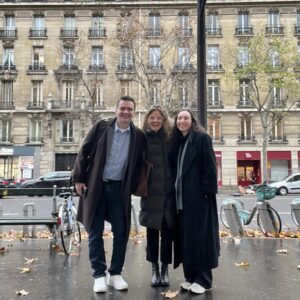European Advocacy for Israeli-Palestinian Civil Society Peacebuilding
The unprecedented nature and grisly details of the attack on October 7th by Hamas and the mounting civilian loss of life – especially of children – in Gaza through countless airstrikes and the IDF ground invasion has deeply shocked our community. These horrors continue to fuel already rampant dehumanization and hatred between Israelis and Palestinians, between Jews and Arabs, with profound consequences not only for the region but also for Jewish and Palestinian European communities.
The international community has to find a way out of this nightmare, supporting peace in the region and also addressing tension and violence within its own communities. Antisemitism and Islamophobia are spreading and impacting communities right around the world, and this cannot be left unaddressed. The Alliance for Middle East Peace, a network of over 160 peacebuilding organizations, has been urging policy makers to do just that for nearly two decades. Our European advocacy team has been speaking to policymakers and government representatives from the UK, France, Germany and the European Union about how they can support efforts toward peace.

The German-French Parliamentary Assembly met on December 4th in Bonn, Germany, to discuss their countrys’ joint role in the Middle East.
After the devastation of World War II, Franco-German relations underwent a remarkable transformation, evolving from historical animosity to a model of post-conflict cooperation. Leaders from both countries played pivotal roles in fostering reconciliation through initiatives like the Élysée Treaty signed in 1963, which laid the foundation for close cooperation in all sectors. With civil society exchange in particular becoming a cornerstone of Franco-German reconciliation, NGO and grassroots movements facilitated people-to-people connections, fostering mutual understanding. Youth exchange programs, bilingual education initiatives, Franco-German town twinning partnerships as well as economic and scientific exchange programs played key roles, allowing young Germans and French to interact, dispelling stereotypes, and building a shared vision for a peaceful future. Drawing inspiration from the Franco-German model, civil society cooperation in Israel and Palestine could follow a similar path.
ALLMEP has reached out to representatives of the Assembly, elevating the opportunity for France and Germany to spearhead a multilateral, long-term strategy that supports civil society and disrupts hate and dehumanization. Such a strategy would prioritize laying foundations for Israeli/Palestinian and Arab/Jewish partnership at a scale that can deliver justice, equality, and peace for all. In response, French MP M. Frédéric Petit delivered this speech during the Assembly meeting, vocalizing his support for civil society peacebuilding, and the key role that Germany and France must play – together – in uplifting Israelis and Palestinians that are working – as the French and Germans have been doing – together to find peace and security for all.
More recently, on December 15th, the European Council met in Brussels, with the situation in the Middle East as a key agenda item. In advance of that meeting, our European Advocacy Team spoke to the office of Council President Charles Michel about including language in a joint statement that focuses on the need for international coordination in the support of civil society peacebuilding efforts in Israel/Palestine. ALLMEP then reached out to all 27 members of the Council to urge them to support the inclusion of this language:
“We also recognise the importance of civil society and bottom-up efforts to root and sustain any diplomatic process. We support the idea of a multilateral working group or an International Fund for Israeli-Palestinian Peace that can coordinate a wide array of states’ efforts toward that goal.”
Similar to the German-French Parliamentary Assembly, the European Union also stands as a remarkable testament to post-war reconciliation. It emerged from the ashes of World War II with the primary goal of promoting peace and cooperation among nations that had long been divided by conflict. By facilitating programs that encourage cross-cultural understanding on the civil society level, the EU has nurtured a sense of unity and shared identity among its diverse member states.
Support for civil society is a cornerstone of European foreign policy; yet the bedrock of multilateralism, a quintessential European value, has been absent from the Israeli-Palestinian conflict. Navigating a complex geopolitical landscape, the EU has cultivated robust diplomatic and economic ties with both Gulf and Arab states, simultaneously garnering legitimacy in the eyes of both Israelis and Palestinians. Rooted in the imperative of consensus building, a central tenet of its identity, the EU emerges as a seasoned actor adept at addressing conflicts within Europe and on the international stage.
European governments, and those around the world, must be in solidarity with civil society. Our diplomatic strategies should be predicated on scaling, supporting, and strengthening those shaping a more peaceful and just future for the region. Rather than focusing on binary narratives that center or alienate one community over another, it is solidarity movements, justice movements, peace movements, that will lay the foundation on which a real diplomatic solution can thrive. After thirty years of failed diplomacy and broken promises, leading now to the greatest tragedy in the history of this conflict: we owe Israelis and Palestinians no less.






